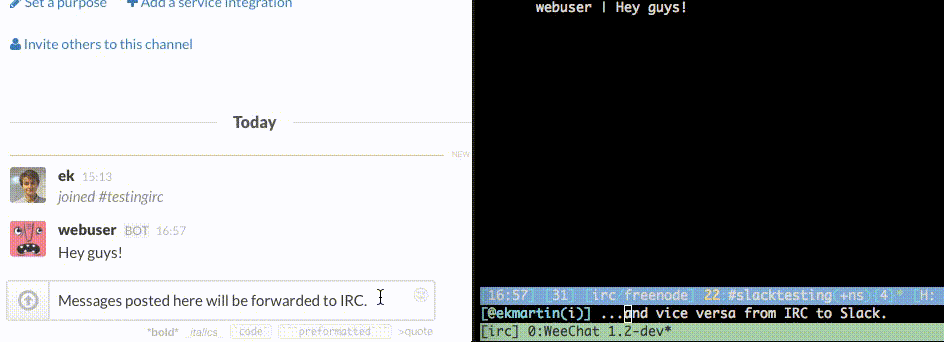slack-irc
v3.11.3
Published
Connects IRC and Slack channels by sending messages back and forth.
Downloads
161
Maintainers
Readme
slack-irc 


Connects Slack and IRC channels by sending messages back and forth. Read more here.
Demo

Installation and usage
Note: node-irc uses icu-charset-detector as an optional dependency, which might fail to install depending on how you've installed Node.js. slack-irc works fine anyhow though, so no need to worry.
Installing with npm:
$ npm install -g slack-irc
$ slack-irc --config /path/to/config.jsonor by cloning the repository:
$ git clone https://github.com/ekmartin/slack-irc.git && cd slack-irc
$ npm install
$ npm run build
$ npm start -- --config /path/to/config.json # Note the extra -- hereIt can also be used as a node module:
var slackIRC = require('slack-irc');
var config = require('./config.json');
slackIRC(config);Configuration
slack-irc uses Slack's bot users.
This means you'll have to set up a bot user as a Slack integration, and invite it
to the Slack channels you want it to listen in on. This can be done using Slack's /invite <botname>
command. This has to be done manually as there's no way to do it through the Slack bot user API at
the moment.
slack-irc requires a JSON-configuration file, whose path can be given either through
the CLI-option --config or the environment variable CONFIG_FILE. The configuration
file needs to be an object or an array, depending on the number of IRC bots you want to run.
This allows you to use one instance of slack-irc for multiple Slack teams if wanted, even if the IRC channels are on different networks.
To set the log level to debug, export the environment variable NODE_ENV as development.
slack-irc also supports invite-only IRC channels, and will join any channels it's invited to as long as they're present in the channel mapping.
Example configuration
Valid JSON cannot contain comments, so remember to remove them first!
[
// Bot 1 (minimal configuration):
{
"nickname": "test2",
"server": "irc.testbot.org",
"token": "slacktoken2",
"channelMapping": {
"#other-slack": "#new-irc-channel"
}
},
// Bot 2 (advanced options):
{
"nickname": "test",
"server": "irc.bottest.org",
"token": "slacktoken", // Your bot user's token
"avatarUrl": "https://robohash.org/$username.png?size=48x48", // Set to false to disable Slack avatars
"slackUsernameFormat": "<$username>", // defaults to "$username (IRC)"; "$username" overides so there's no suffix or prefix at all
"ircUsernameFormat": "<$username> ", // defaults to "<$username>"; "$username" overides so there's no suffix or prefix at all
"autoSendCommands": [ // Commands that will be sent on connect
["PRIVMSG", "NickServ", "IDENTIFY password"],
["MODE", "test", "+x"],
["AUTH", "test", "password"]
],
"channelMapping": { // Maps each Slack-channel to an IRC-channel, used to direct messages to the correct place
"#slack": "#irc channel-password", // Add channel keys after the channel name
"privategroup": "#other-channel" // No hash in front of private groups
},
"ircOptions": { // Optional node-irc options
"floodProtection": false, // On by default
"floodProtectionDelay": 1000 // 500 by default
},
// Makes the bot hide the username prefix for messages that start
// with one of these characters (commands):
"commandCharacters": ["!", "."],
// Prevent messages posted by Slackbot (e.g. Slackbot responses)
// from being posted into the IRC channel:
"muteSlackbot": true, // Off by default
// Sends messages to Slack whenever a user joins/leaves an IRC channel:
"ircStatusNotices": {
"join": false, // Don't send messages about joins
"leave": true
},
// Prevent messages posted by users on Slack/IRC from being forwarded:
"muteUsers": {
"irc": ["irc-user"],
"slack": ["slack-user"]
}
}
]ircOptions is passed directly to node-irc (available options).
Personal IRC Client
slack-irc strengths mainly lie in many-to-many communication from Slack to IRC (and vice versa), and is thus not very suitable as a makeshift IRC client for one user. If that's what you need, check out aeirola/slack-irc-client, which adds an array of features to solve this problem as smoothly as possible.
Development
To be able to use the latest ES2015+ features, slack-irc uses Babel.
Build the source with:
$ npm run buildTests
Run the tests with:
$ npm testStyle Guide
slack-irc uses a slightly modified version of the Airbnb Style Guide. ESLint is used to make sure this is followed correctly, which can be run with:
$ npm run lintThe deviations from the Airbnb Style Guide can be seen in the .eslintrc file.
Docker
A third-party Docker container can be found here.
